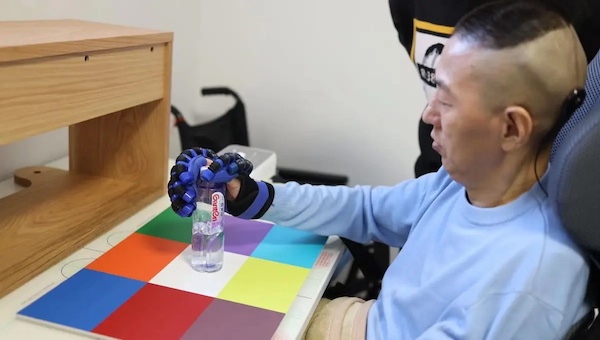
THE PATIENT GRASPS A BOTTLE USING THE NEO WIRELESS BCI SYSTEM AND A PROSTHETIC HAND - TSINGHUA UNIVERSITY
CHINA PREPARES BOLD BRAIN IMPLANT TRIALS TO RIVAL ELON MUSK’S NEURALINK
BY: SUJITA SINHAORIGINAL SITE: INTERESTING ENGINEERING
The NEO BCI implant was successfully embedded in just 1 hour and 40 minutes, thanks to an innovative online brain function localization system.
China is making significant strides in brain-computer interface (BCI) technology, with plans for a large-scale clinical trial set for next year.
According to a Shanghai Science & Technology social media post, the groundbreaking Neural Electronic Opportunity (NEO) device has already shown remarkable results in three patients.
Implant aiding spinal cord injury patients
NEO, a semi-invasive BCI developed in China, represents a collaborative effort between Neuracle Technology and Tsinghua University’s biomedical engineering team led by Hong-Bo.
The device was
successfully
implanted into a 38-year-old spinal cord injury patient in Shanghai who had lost mobility and hand function due to a car accident.
During the procedure, a coin-sized device was embedded in the skull to collect neural signals from sensory and motor brain areas. Power and signal transmission were facilitated by an external magnetic coil connected through the scalp.
Unlike Elon Musk’s Neuralink, which directly places chips in the brain, NEO uses a semi-invasive approach. Electrodes are positioned outside the brain cortex, avoiding direct contact with brain tissue.
“The results are even better than we expected,” said Mao Ying, head of the National Centre for Neurological Disorders and director at Huashan Hospital, who was part of the implantation team.
Using a prosthetic glove, the patient could control brain signals to perform daily tasks like picking up a water cup, unscrewing a bottle cap, and drinking.
Speedy surgery and broader applications
The operation, conducted in November, was completed in just 1 hour and 40 minutes thanks to an online brain function localization system. This innovation allowed surgeons to pinpoint hand motor and sensory brain regions rapidly.
“The patient’s recovery was smooth, and improvements were very noticeable,” Mao added .
The NEO device has already proven its efficacy in two earlier implantations conducted in Beijing last year, where paralyzed patients independently moved a computer cursor and drank water.
In August, NEO became the first BCI to enter China’s “green channel” for special approval of innovative medical devices. It is projected to be available for clinical use by 2027.
Plans for the upcoming trial include at least 30 implantations across China. The announcement was made at the BCI Society and Chen Institute Joint BCI Meeting in Shanghai.
“BCI is a convergence of artificial intelligence, integrated circuits, and biomedical technology,” noted Tao Hu, deputy director of the Shanghai Institute of Microsystems and Information Technology at the Chinese Academy of Sciences.
“As an emerging industry, it still requires concentrated investment of various resources.”
RECOMMENDED ARTICLES
Global -progress in brain-computer interfaces
While China focuses on advancing semi-invasive BCI technology, Elon Musk’s Neuralink continues to expand its initiatives. Neuralink recently announced the approval for its CONVOY feasibility study to integrate brain implants with assistive robotic arms.
Neuralink’s ongoing PRIME study, which uses BCI implants for digital and physical freedom, has made strides in helping patients with quadriplegia control devices like computers and smartphones using only their thoughts.
The company is also broadening its international footprint, with Canada approving the CAN-PRIME study to recruit patients for trials. Canadian neurosurgeons aim to implant 64 electrodes in hand-motor brain areas, allowing patients to control devices through thought-driven commands.
AWFSM CATEGORIES
Activism | AI | Belief | Big Pharma | Conspiracy | Cult | Culture | Deep State | Economy | Education | Entertainment | Environment | Faith | Global | Government | Health | Hi Tech | Leadership | Politics | Prophecy | Science | Security | Social Climate | Universe | War
